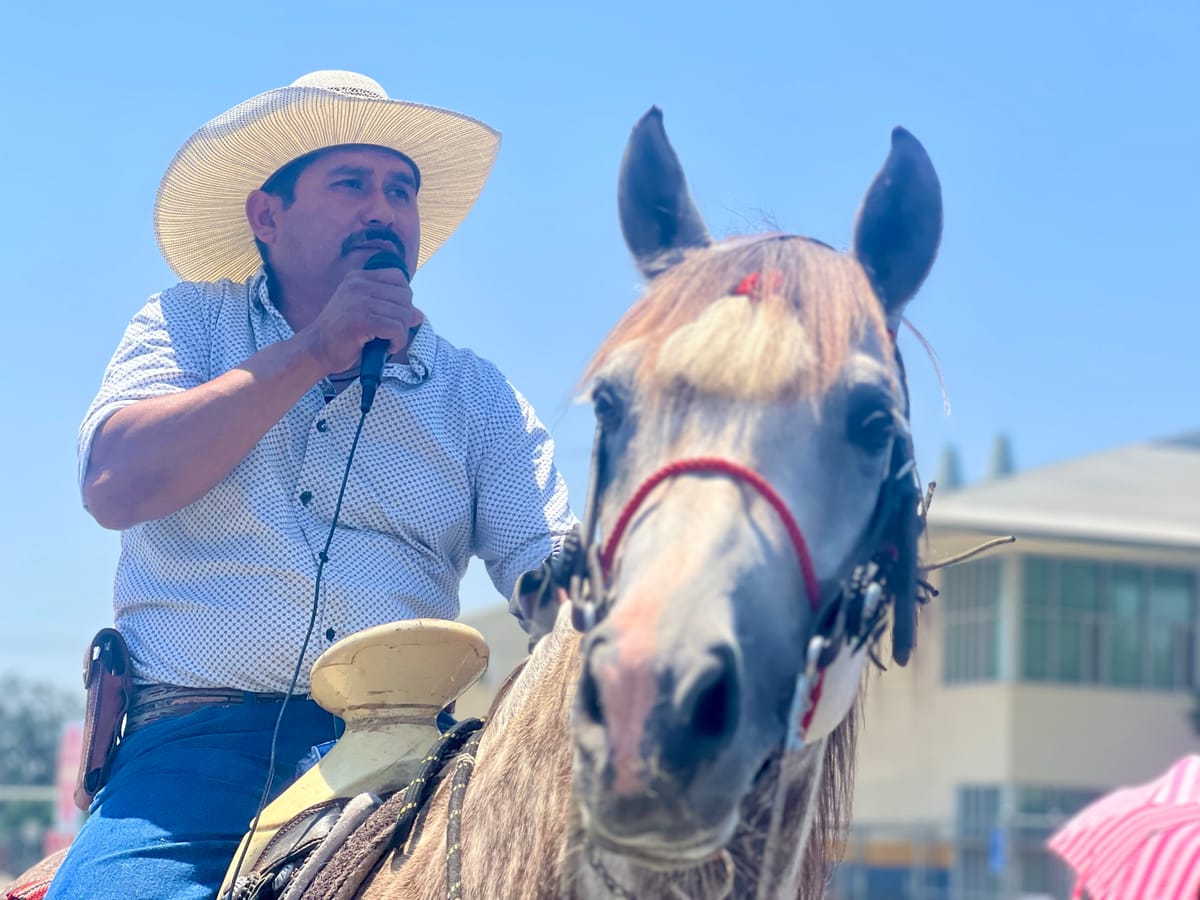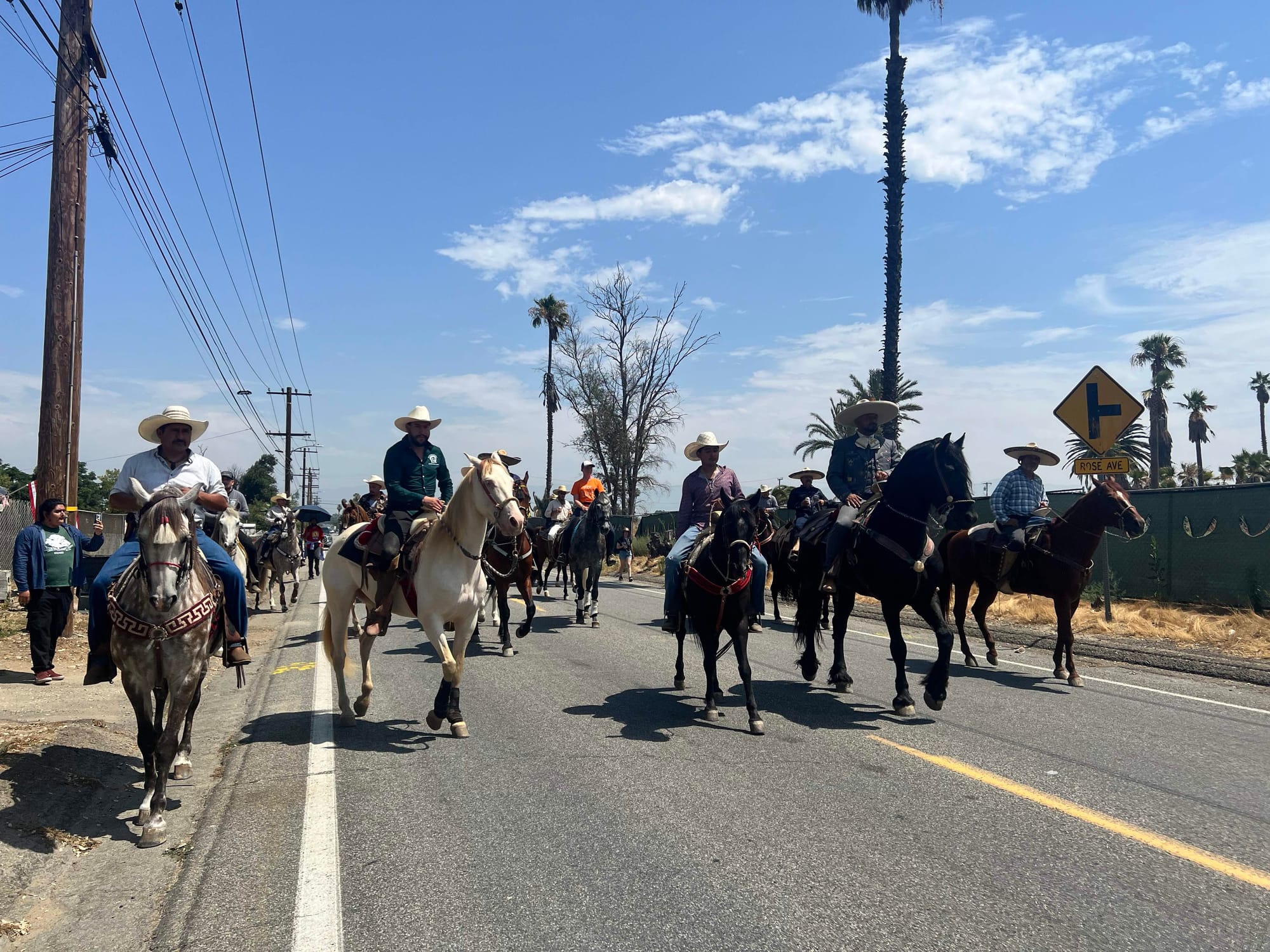‘Vaqueros’ on horseback rally in Bloomington to support evicted family impacted by warehousing

Dozens of horseback riders gathered in Bloomington on July 13 for a community ‘cabalgata’ or horse parade to support renter Felipe Ortiz and his family. A 213-acre warehouse project has forced the Ortiz family out of their home.
The event’s entry fees and food sales were used to support the Ortiz family as they search for a new home, following an agreement with the Orange-based developer to vacate the property by next month. The cabalgata began and ended at Ortiz's rented property on Locust Avenue. Vaqueros (or cowboys) could be seen on horseback riding through the perimeter of the proposed Bloomington Business Park near Kessler Park and Zimmerman Elementary School.
Ortiz expressed his gratitude to those who attended the cabalgata in his native Spanish. “I know the support comes from the bottom of your hearts,” he said. “Like I’ve always said, if I could help—whether it’s helping organize a cabalgata or with something else—I’m here to serve.”
One of the event’s organizers, Sam Brown Vasquez of Avocado Heights Vaquer@s and Union de Ranchos, highlighted the concerns of ranchers and residents from equestrian neighborhoods across Southern California. Like Ortiz and his family, they hold large concerns over industrial development and pollution impacts.
Vasquez considers warehouse growth across the region as an attempt to eradicate the vaquero lifestyle and culture. "We’re here because we have to draw the line. What’s happening is so egregious that if we don’t take a stance now, it’s just gonna keep on happening," said Vasquez. "A lot of people are saying Bloomington is a lost cause. It’s never a lost cause.”
The Bloomington Business Park Specific Plan will bring 2 million square feet (or 50 football fields) of warehousing to an area where many homes once stood and where the Ortiz’s rented land is now. Bulldozers and construction workers have already cleared homes surrounding the Ortiz’s rented property on Locust Avenue for the 213-acre Bloomington Business Park Specific Plan.
The project also impacts Zimmerman Elementary School, which will be demolished and rebuilt at a different site about a mile away from its current location on Linden Avenue. School district officials say the new site will be on a 28-acre plot of land owned by the school district, bordering Santa Ana, Cedar, and Larch Avenues, although a final decision has not yet been made.

Ortiz claims that on January 24, representatives from Howard Industrial Partners locked him inside his home when he tried to step out of his front gate. While they eventually opened the gate, Ortiz says that only a few weeks later, they brought a bulldozer and knocked down the gate in an attempt to demolish the property. On that same day, Ortiz learned his property was sold when he was issued a 60-day eviction notice saying he had until April 13 to leave.
Ortiz eventually settled with Howard Industrial Partners for $15,000 and is required to leave the property by August.
Michael Tunney, the vice president of development with Howard Industrial Partners, said in an emailed statement Ortiz was not informed of the sale of the property. “That information was the duty of the previous property owner,” wrote Tunney. “Additionally, it was not disclosed to us that there were occupants on the property.”
Tunney added that on June 12, Ortiz signed a settlement agreeing to vacate the property by early August. “Despite having no contractual obligation to do so, the company provided Ortiz with $15,000 to assist with relocation, and those funds were paid to his attorney,” he shared.
Bloomington resident Joaquin Castillejos, who is also with the Center for Community Action and Environmental Justice (CCAEJ), notes many of the dismantled homes and properties were once ranches full of goats, chickens and life.
“Now, there are other parts of Bloomington being targeted, where developers seek one-acre and two-acre lots to build warehouses," he added.
Both Castillejos and Vasquez say the situation with the Ortiz family should serve as a reference for people in the community to be aware and informed of land use planning and zoning policy.
Regarding their future, Blanca Ortiz says, "We still don't have anywhere to go. All of this was too sudden. But we're doing something here that will allow us to raise our voices to shed light on what's been going on with us and other families."
This story has been published and produced in collaboration with KVCR Public Media. A radio version of this story can be heard here.
